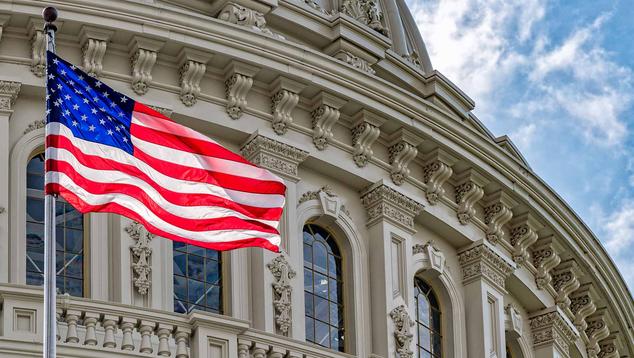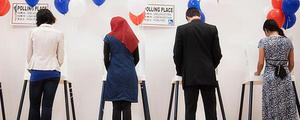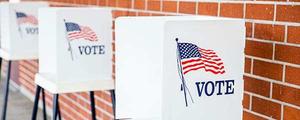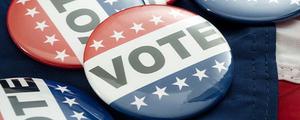This is the fourth installment in a series of brief overviews looking at what Americans want political candidates and elected officials to do about the key issues of the day. The first review looked at the consensus top problem leading into the election -- the economy and inflation. The second focused on three high-profile values issues -- abortion, critical race theory, and gender identity. The third review looked at three additional hot-button issues prominent in this year's campaigns -- gun control, immigration and climate change. This review looks at the big-picture issue of the people's relationship to their federal government and what the people would like to see changed if they had their say.
Americans' relationship to their federal government has been an issue since the nation's beginning. The United States was founded on the concept of individual freedom and liberty and avoiding the tyranny of a central authority (i.e., monarchies). Yet the Founders saw the need for a new type of central authority (i.e., the federal government) as they envisioned the optimal way for a growing nation to function and survive. Tensions have resulted ever since.
Americans today are as likely to mention issues relating to their government and political leadership as the most important problem facing the country as any other single issue. Many other measures of Americans' views of their government are deep in negative territory. Trust in the three branches of government is low; the majority of Americans say the federal government is not effective in making a positive impact on people's lives; the federal government itself is given a very low positive rating; approval of the job Congress is doing is very low; the majority of Americans are pessimistic about the future of politics in the country; two-thirds of registered voters say the government mainly works to benefit political elites; and so forth.
But there is a paradox here. While vilifying their government in response to some questions, Americans tell pollsters in response to other questions that they appreciate many of the services the government provides.
Gallup polling shows the majority of Americans say the federal government should have the responsibility for a number of societal functions, including protection from foreign threats, protection from unsafe products, preventing discrimination, maintaining the nation's transportation systems, protecting the environment and making sure Americans have adequate healthcare. Pew Research recently found over half of Americans agreeing that the federal government should play a "major role" in addressing the 12 different functions measured. And, Americans have generally been positive about the massive government outlays put into place over the years since the beginning of the pandemic.
Americans are thus negative about the government in general, while simultaneously recognizing that the government performs positive functions. This suggests, in turn, that leaders and elected officials need to be cautious in taking extreme positions either heavily critical of everything the federal government does or unquestioningly focusing on expanding its role. To reflect public opinion, leaders need to recognize that the public sees the federal government as having deep flaws, while also perceiving it as deeply necessary to keep the nation functioning.
Americans' Conflicted Views of Government Power
This conflictual nature of Americans' relationship to their government is clearly evident in data measuring perceptions of government power.
My colleague Jeff Jones recently reviewed data showing that Americans in recent years have tilted toward the view that the federal government has too much power and that the government is doing too many things that should be left to business and industry.
At the same time, Americans are positive about a number of functions the government takes on and are positive about the job that a not-insignificant number of government agencies and departments are doing.
Gallup data show, for example, that Americans give positive ratings to the U.S. Postal Service, NASA and the CIA (and the U.S. military), while being much less positive about other agencies and departments. A couple of years ago, Pew Research used different question wording that revealed a more positive picture; Americans in that research had favorable ratings of all but one agency or department tested. And a 2021 survey conducted for the Partnership for Public Service found majorities of Americans had positive opinions of many government agencies, even though in the same poll, the favorable rating of the "federal government" per se was well below majority level.
Gallup in 2019 found that a majority of Americans said government should have more responsibility for seven out of 11 government functions listed. (Less than half said the government should take on more responsibility for upholding moral standards, reducing income differences, or protecting major U.S. corporations, but in no instance did a majority say the government should have less responsibility.) That same year, Gallup gave Americans a five-point scale measuring views of the appropriate role of government. The results showed Americans tilt more toward "tak[ing] active steps in every area it can to try and improve to lives of its citizens" than to "do[ing] only those things necessary to provide the most basic government functions."
So, while the data on government power might suggest that, if the people had their way, the federal government should cut back on what it does and reduce its role in American life, other data qualify that conclusion. Americans concede that the government performs many needed functions, and in some instances, gets credit for doing them well.
The headline from a recent Pew Research report provides a useful summary: "Americans' Views of Government: Decades of Distrust, Enduring Support for Its Role."
Little Disagreement With Efforts to Make Government More Efficient
A number of recent presidents have promulgated efforts to make the federal government operate more efficiently and effectively. The Clinton-Gore administration announced a "National Partnership for Reinventing Government"; Donald Trump attempted to "deconstruct the deep state"; and Joe Biden has signed an "Executive Order on Transforming Federal Customer Experience and Service Delivery to Rebuild Trust in Government."
Not much polling focuses directly on Americans' views of these types of efforts. But I think it's a safe assumption that Americans would find little reason to oppose such plans to increase government effectiveness and efficiency and to improve service delivery.
A 2021 poll conducted for the Partnership for Public Service, for example, found large majorities of Americans saying the government is too bureaucratic, wasteful and incompetent, among other things. (Although Americans were more positive about federal employees per se.) And a 2019 Gallup poll showed seven in 10 Americans agreeing that businesses can do things more efficiently than government.
Compromise in Order to Get Things Done
Americans have over the years evinced a consistent preference for their elected leaders to compromise in order to get things done rather than sticking to their beliefs or principles, pushing their own party's political agenda or fighting for personal values.
This desire for compromise stands in contrast to the widely recognized increase in polarization in U.S. politics. As I've noted in a recent analysis, the structure of politics today can reward candidates and elected officials who play to a relatively narrow audience of ideologues who regularly vote in party primaries and who are less interested than the general population in compromise. This puts politicians who may want to compromise in a difficult position.
The structure of politics today, in short, is geared away from compromise, even as the majority of the people say that is exactly what they want. But difficult though it may be in practice, elected officials would do well to take heed.
(This type of compromise, it should be noted, actually does occur in some instances. As The Washington Post Editorial Board has noted, "The 117th Congress has compiled a significant legislative record since it convened on Jan. 3, 2021." The Post editorial's apt headline is, "This Congress Has Gotten More Done Than You Might Realize." But the American people say more of this is needed.)
Enact a Number of Specific Election Reforms
One other thing is clear from a review of recent data: Americans support a laundry list of structural reforms in the process of how politicians are elected in this country. This fits with a general conclusion that the public is more negative about the men and women who are elected to oversee the government than they are about the government per se.
One of the most significant -- and most supported -- proposals has been for the elimination of the Electoral College. Gallup has been asking Americans about this proposal for almost 80 years, and has never found less than majority support for the idea. Most recently, 61% of Americans favor amending the Constitution "so the candidate who receives the most total votes nationwide wins the election," as opposed to keeping the current system "in which the candidate who wins the most votes in the Electoral College wins the election."
A multitude of other polls have asked about eliminating the Electoral College, and all that I am aware of have shown majority support.
There is support for other election reforms as well. Americans have long favored campaign finance reform, including limiting campaign contributions and campaign expenditures and 100% federal funding of congressional election campaigns. This follows from Gallup polling showing that a majority of Americans are dissatisfied with the way campaigns are financed today.
Past Gallup polling has also shown support for term limits on members of Congress and senators, for shortening presidential campaigns to just five weeks before Election Day, and for choosing each party's presidential candidate by a nationwide primary election on one day instead of by individual state primaries.
Gallup finds that a majority of Americans favor a third party, leading Gallup analyst Lydia Saad to conclude, "There is demand across the political spectrum for better leadership that well-conceived third parties may be able to tap into."
The point here: There is support for many different ways of structurally reforming the election process. To date, however, none of these efforts have been given a realistic chance of becoming law.
Americans OK if More Power Is Devolved to the States
Finally, as I discussed in a recent review, Americans generally would appear to approve of the devolution of federal power back down to the states -- something that appears to be occurring today in some instances.
Americans are more trusting of government the closer to home it is. This translates into higher approval for state governments than for the more distant federal government. And that, in turn, translates into approbation for putting more power in the hands of state governments. Supporting this conclusion, a Gallup trend question from a few years ago showed that Americans say they actually would prefer a state-centric government over one focused on federal government power.
Bottom Line
In conclusion, I think elected officials and government leaders who are attempting to follow majority public opinion would and should above all else recognize the complexity of Americans' relationship to their federal government. Americans have a generally negative view of their government, to be sure, but at the same time recognize the vital role it plays in providing needed services and functions, and they don't want those endangered. Americans acknowledge that the government can and should operate in a more efficient and effective way, and the public remains critical of some government departments and agencies. Additionally, a good deal of the negativity heaped on government appears to reflect negativity about those elected to oversee it; and Americans endorse changes in the way politicians go about their business, focused mainly on more compromise and less "my way or the highway" ideological rigidity. Americans also want changes in the vastly complex way in which politicians are elected to office, including getting rid of the Electoral College in presidential elections and reforming other aspects of congressional and senatorial elections.




